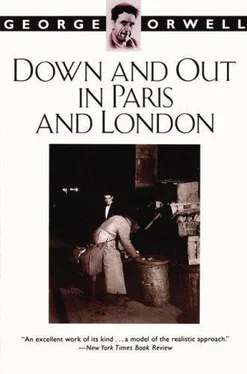George Orwell - Down and Out in Paris and London
Здесь есть возможность читать онлайн «George Orwell - Down and Out in Paris and London» весь текст электронной книги совершенно бесплатно (целиком полную версию без сокращений). В некоторых случаях можно слушать аудио, скачать через торрент в формате fb2 и присутствует краткое содержание. Жанр: Старинная литература, на русском языке. Описание произведения, (предисловие) а так же отзывы посетителей доступны на портале библиотеки ЛибКат.
- Название:Down and Out in Paris and London
- Автор:
- Жанр:
- Год:неизвестен
- ISBN:нет данных
- Рейтинг книги:5 / 5. Голосов: 1
-
Избранное:Добавить в избранное
- Отзывы:
-
Ваша оценка:
- 100
- 1
- 2
- 3
- 4
- 5
Down and Out in Paris and London: краткое содержание, описание и аннотация
Предлагаем к чтению аннотацию, описание, краткое содержание или предисловие (зависит от того, что написал сам автор книги «Down and Out in Paris and London»). Если вы не нашли необходимую информацию о книге — напишите в комментариях, мы постараемся отыскать её.
Down and Out in Paris and London — читать онлайн бесплатно полную книгу (весь текст) целиком
Ниже представлен текст книги, разбитый по страницам. Система сохранения места последней прочитанной страницы, позволяет с удобством читать онлайн бесплатно книгу «Down and Out in Paris and London», без необходимости каждый раз заново искать на чём Вы остановились. Поставьте закладку, и сможете в любой момент перейти на страницу, на которой закончили чтение.
Интервал:
Закладка:
afraid. You think vaguely, "I shall be starving in a day or
two-shocking, isn't it?" And then the mind wanders to
other topics. A bread and margarine diet does, to some
extent, provide its own anodyne.
And there is another feeling that is a great consola-
tion in poverty. I believe everyone who has been hard up
has experienced it. It is a feeling of relief, almost of
pleasure, at knowing yourself at last genuinely down
and out. You have talked so often of going to the dogs -
and well, here are the dogs, and you have reached them,
and you can stand it. It takes off a lot of anxiety.
IV
ONE day my English lessons ceased abruptly. The
weather was getting hot and one of my pupils, feeling
too lazy to go on with his lessons, dismissed me. The
other disappeared from his lodgings without notice,
owing me twelve francs. I was left with only thirty
centimes and no tobacco. For a day and a half I had
nothing to eat or smoke, and then, too hungry to put it
off any longer, I packed my remaining clothes into my
suitcase and took them to the pawnshop. This put an
end to all pretence of being in funds, for I could not take
my clothes out of the hotel without asking Madame F.'s
leave. I remember, however, how surprised she was at
my asking her instead of removing the clothes on the
sly, shooting the moon being a common trick in our
quarter.
It was the first time that I had been in a French
pawnshop. One went through grandiose stone portals
(marked, of course, «
Liberté, Égalité, Fraternité "-they
write that even over the police stations in France) into a
large, bare room like a school classroom, with a counter
and rows of benches. Forty or fifty people were waiting.
One handed one's pledge over the counter and sat down.
Presently, when the clerk had assessed its value he
would call out, « Numéro such and such, will you take
fifty francs?" Sometimes it was only fifteen francs, or
ten, or five-whatever it was, the whole room knew it.
As I came in the clerk called with an air of offence,
«
Numéro 83-here!" and gave a little whistle and a
beckon, as though calling a dog.
Numéro 83 stepped to
the counter; he was an old bearded man, with an over-
coat buttoned up at the neck and frayed trouser-ends.
Without a word the clerk shot the bundle across the
counter-evidently it was worth nothing. It fell to the
ground and came open, displaying four pairs of men's
woollen pants. No one could help laughing. Poor
Numéro
83 gathered up his pants and shambled out, muttering to
himself.
The clothes I was pawning, together with the suitcase,
had cost over twenty pounds, and were in good condition.
I thought they must be worth ten pounds, and a quarter
of this (one expects quarter value at a pawnshop) was
two hundred and fifty or three hundred francs. I waited
without anxiety, expecting two hundred francs at the
worst.
At last the clerk called my number: «
Numéro 97!"
"Yes," I said, standing up.
"Seventy francs?"
Seventy francs for ten pounds' worth of clothes! But it
was no use arguing; I had seen someone else attempt to
argue, and the clerk had instantly refused the pledge. I
took the money and the pawnticket and walked out. I
had now no clothes except what I stood up in-the coat
badly out at the elbow-an overcoat, moderately pawnable,
and one spare shirt. Afterwards, when it was too late, I
learned that it was wiser to go to a pawnshop in the
afternoon. The clerks are French, and, like most French
people, are in a bad temper till they have eaten their
lunch.
When I got home, Madame F. was sweeping the
bistro floor. She came up the steps to meet me. I could
see in her eye that she was uneasy about my rent.
"Well," she said, "what did you get for your clothes?
Not much, eh?"
"Two hundred francs," I said promptly.
"
Tiens !" she said, surprised; "well, that's not bad.
How expensive those English clothes must be!"
The lie saved a lot of trouble, and, strangely enough, it
came true. A few days later I did receive exactly two
hundred francs due to me for a newspaper article, and,
though it hurt to do it, I at once paid every penny of it in
rent. So, though I came near to starving in the following
weeks, I was hardly ever without a roof.
It was now absolutely necessary to find work, and I
remembered a friend of mine, a Russian waiter named
Boris, who might be able to help me. I had first met him
in the public ward of a hospital, where he was being
treated for arthritis in the left leg. He had told me to come
to him if I were ever in difficulties.
I must say something about Boris, for he was a
curious character and my close friend for a long time. He
was a big, soldierly man of about thirty-five, and had
been good-looking, but since his illness he had grown im-
mensely fat from lying in bed. Like most Russian
refugees, he had had an adventurous life. His parents,
killed in the Revolution, had been rich people, and he had
served through the war in the Second Siberian Rifles,
which, according to him, was the best regiment in the
Russian Army. After the war he had first worked in a
brush factory, then as a porter at Les Halles, then had
become a dishwasher, and had finally worked his way up
to be a waiter. When he fell ill he was at the Hôtel Scribe,
and taking a hundred francs a day in tips. His ambition
was to become a maitre d'hdtel, save fifty thousand
francs, and set up a small, select restaurant on the Right
Bank.
Boris always talked of the war as the happiest time
0f his life. War and soldiering were his passion; he
had read innumerable books 0f strategy and military
history, and could tell you all about the theories 0f
Napoleon, Kutuzof, Clausewitz, Moltke and Foch.
Anything to do with soldiers pleased him. His favourite
café was the Closerie des Lilas in Montparnasse,
simply because the statue 0f Marshal Ney stands
outside it. Later 0n, Boris and I sometimes went to the
Rue du Commerce together. If we went by Metro, Boris
always got out at Cambronne station instead 0f
Commerce, though Commerce was nearer; he liked the
association with General Cambronne, who was called
on to surrender at Waterloo, and answered simply,
«
Merde ! »
The only things left to Boris by the Revolution were
his medals and some photographs of his old regiment;
he had kept these when everything else went to the
pawnshop. Almost every day he would spread the
photographs out on the bed and talk about them:
"
Voila, mon ami ! There you see me at the head 0f my
company. Fine big men, eh? Not like these little rats 0f
Frenchmen. A captain at twenty-not bad, eh? Yes, a
captain in the Second Siberian Rifles; and my father
was a colonel.
«
Ah, mais, mon ami , the ups and downs of life! A
captain in the Russian Army, and then, piff! the Revo-
lution-every penny gone. In 1916 I stayed a week at the
Hotel Édouard Sept; in 1920 I was trying for a job as
night watchman there. I have been night watchman,
cellarman, floor scrubber, dishwasher, porter, lavatory
attendant. I have tipped waiters, and I have been
tipped by waiters.
« Ah, but I have known what it is to live like a
Читать дальшеИнтервал:
Закладка:
Похожие книги на «Down and Out in Paris and London»
Представляем Вашему вниманию похожие книги на «Down and Out in Paris and London» списком для выбора. Мы отобрали схожую по названию и смыслу литературу в надежде предоставить читателям больше вариантов отыскать новые, интересные, ещё непрочитанные произведения.
Обсуждение, отзывы о книге «Down and Out in Paris and London» и просто собственные мнения читателей. Оставьте ваши комментарии, напишите, что Вы думаете о произведении, его смысле или главных героях. Укажите что конкретно понравилось, а что нет, и почему Вы так считаете.












